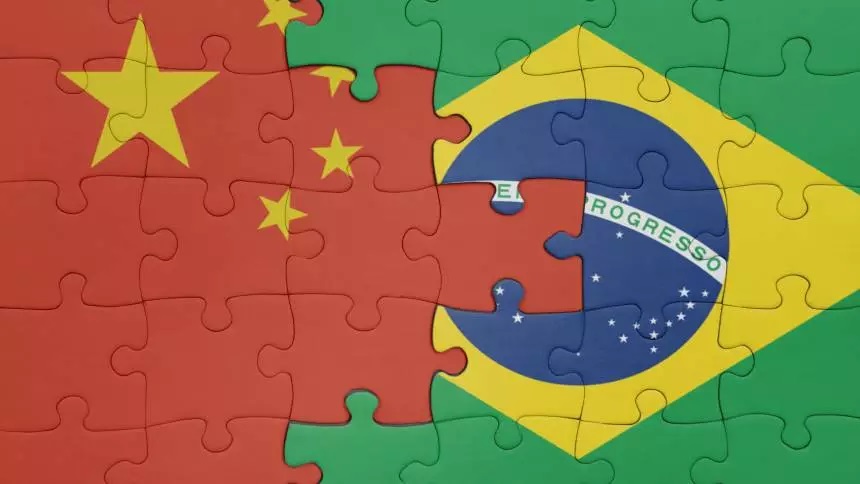
Published 11/11/2024 08:34 | Edited 11/11/2024 09:54
On October 8, the chairman of China’s economic planning council, Zheng Shanjie, told reporters that the Asian giant is “completely confident” in achieving its economic goals for 2024. Depending on the city of Chongqing, one of the four municipalities under direct administration of the central government of the People’s Republic of China, the 5% GDP (Gross Domestic Product) growth target set by President Xi Jinping will not be a problem.
And in the wake of achieving the goal is Brazil and the intention of establishing a “win-win” game between the two countries, which in August completed 50 years of diplomatic relations. Amid the celebrations, China has invested in an unprecedented way in Brazil and advanced cooperation with different sectors of the national economy.
In São Paulo, the state-owned giant Power China, one of the companies headquartered in the city of Chongqing, leads the consortium with the construction company Mendes Júnior, a company destroyed by Lava Jato and in a situation of judicial recovery, to carry out the expansion of Line 2 – Green by Metro, which can reach from Vila Prudente to Guarulhos airport.
The Chinese signed the contract with the government of the State of São Paulo in 2019 and in 2021 they began operating in lots 3, 4 and 5 of the tender. These works include a ventilation shaft, two emergency and ventilation passages, four underground tunnels (with a total length of 2.2 km), five metro stations and a transport transfer center.
The completion of the works, scheduled by the São Paulo government for 2027, will contribute to the expansion of the capillarization of transport modes in the city, which today is still dependent on cars and motorcycles for long distances.
According to one of the company’s directors, Chinese executive Zheng Weijia, “the completion of the project will significantly improve the infrastructure and public transport system in the state of São Paulo, playing a positive role in reducing carbon emissions, alleviating congestion, promoting the connection between regions and economic development, in addition to boosting urban sustainability.”
Tarcísio Calderaro, director of Power China in Brazil, states that it is essential that the civil construction sectors of both countries join forces to find solutions both for the expansion of Chinese industry as an alternative to Western giants, and to face the deindustrialization of the Brazilian economy. .
“Brazilian civil construction has already been a reference in engineering, with works including in the Middle East. Today, this sector is weakened. Just as we have already seen the military industry weaken, with the end of Engesa and now the convalescence of Avibras. The cooperation and win-win system devised by China can help us return to Brazil’s vocation.”
In addition to cooperation for the reconstruction of Brazilian industry, Power China highlights the number of jobs opened in this project. There are two thousand direct jobs created in the expansion of the São Paulo metro line and five thousand indirect jobs.
And it’s not just infrastructure that the Chinese have invested in Brazil. This Friday (8), the West China International Communication Organization (WCICO) promoted the event China, an Opportunity: Global Promotion of Chongqing Brands for Brazil, where a series of companies from the city of Chongqing sought to strengthen economic and cultural ties between the Chinese megalopolis and Brazil, opening new opportunities for brands and products from the region in the Brazilian market.
The event was attended by government authorities, institutional and media organizations, academics, opinion makers and business and commercial representatives from China and Brazil.
The special advisor to Minister Luciana Santos (PCdoB) of Science, Technology and Innovation, Euzébio Sousa, spoke about the federal government’s expectations regarding exchanges with China, betting on a new industrial model for the 21st century.
“Strengthening ourselves in the technological and innovation field is fundamental to achieving our objectives, which is to leave the condition of a dependent economy, therefore we must seek an increasingly higher level of qualification in our industrial, scientific and technological production”, declared the special advisor from the Ministry of Science, Technology and Innovation, Euzébio Silveira de Sousa.
The professor at USP’s Institute of International Relations, Yi Shin Tang, spoke about the higher education scenario in Brazil and the opportunities for cooperation with China and Chongqing.
“Brazilian and Chinese universities have developed joint research programs, exchanges of students and teachers, as well as technological innovation projects, such as the joint laboratory for agricultural research to increase the global influence of the two countries in the field of agricultural biotechnology, between the Academy Chinese Agricultural Sciences Corporation and the Brazilian Agricultural Research Corporation (EMBRAPA); the formation of the China-Brazil Climate Change and Energy Technologies Research and Innovation Center with Tsinghua University; the agreement to develop a joint postgraduate training program between the University of São Paulo (USP) and the Zhongyuan University of Technology; cooperation in vaccine research and development, a partnership between Sinovac and the Butantan Institute; and the cooperation agreement between the USP Institute of International Relations and Jinan University and Ocean University”, said Tang.
“To further strengthen this cooperation, it is essential to build relevant cooperation mechanisms and guarantee the quality of partnerships, deepen studies on the educational realities of both countries, establish banks of online education resources and reinforce cooperation in professional education , promoting the exchange of knowledge and the training of highly qualified professionals”, he added.
At the event, a strategic cooperation agreement was also signed between ABI and WCICO, for the creation of the Bridging News Brasil Liaison Office. This office will enhance Chongqing-Brazil collaboration in disseminating news on the expansion of industry and commerce, cultural exchanges and tourism promotion.
Bridging News is an application that disseminates stories from Chongqing and western cities in China to users around the world, with rich information, diverse interaction patterns and different forms of services.
Chongqing is a metropolis in the interior of China, located in the center-west of the country, at the confluence of the China-Europe railway with the Yangtse River waterway. Apparently, the Chinese city will play a major role in the “win-win” cooperation in the commercial relationship between Brazil and China, which promises to boost the trade balance between the two countries.
Source: vermelho.org.br

